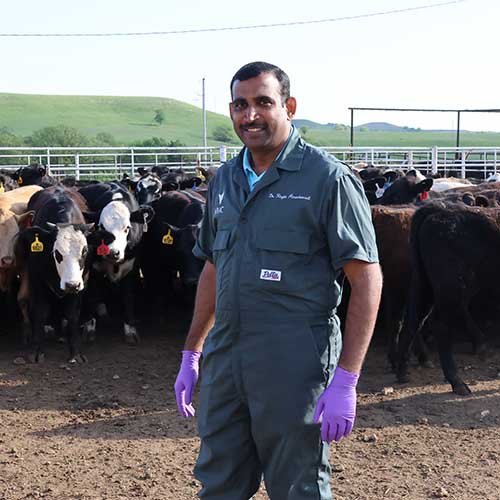June 14, 2023
USDA awards $1 million grant to 'BATTLE' antimicrobial resistance in cattle

A Kansas State University microbiologist will use a $1 million grant from the U.S. Department of Agriculture for the mitigation of antimicrobial resistance, or AMR, across the food chain in the beef cattle production system.
Raghavendra Amachawadi, associate professor in the department of clinical sciences, will lead a team of researchers and extension faculty: T. G. Nagaraja, M. D. Apley, Hans Coetzee, Qing Kang, Sonny Lee, Miles Theurer and Trent Fox to address this high priority issue for both animal agriculture as well as the public health. The project aligns well with the USDA-NIFA's AMR focus on the role of animal agriculture in AMR, antibiotic stewardship in reducing the negative impact from the use of antibiotics, and identifying strategies to mitigate AMR in the food chain. The goal is to reduce the adverse impact of medically important antimicrobials used in food animal agriculture.
In animal agriculture, antimicrobials are used to treat and maintain animal health and well-being. Antimicrobial resistance is a significant public health concern; therefore, the use of antimicrobials in food animals has received a great amount of scrutiny. Antimicrobial-resistant bacteria, including foodborne pathogenic bacteria, have been identified at different stages of the cattle production system and their environment.
"Dr. Amachawadi has assembled a team of K-State scientists, consulting veterinarians and extension specialists to address one of the most critical issues in veterinary and human medicine — antimicrobial resistance," said Frank Blecha, associate dean for research in the College of Veterinary Medicine. "His USDA award on mitigation strategies of antimicrobial resistance in animal agriculture will undoubtedly advance our understanding of antimicrobial use in food animals and enhance food safety."
The long-term goal of this project, "BATTLE: Balancing therapeutic efficacy with antimicrobial resistance in feedlot cattle," is to generate data to inform prudent use of antibiotics and AMR mitigation strategies by balancing therapeutic efficacy and concerns around AMR bacteria/genes in cattle and their environment. Amachawadi and his team seek to guide mitigation strategies toward a goal of reducing the use of antimicrobial metaphylaxis in feedlot cattle. This synergy between researchers, consulting veterinarians and beef extension specialists provides a unique opportunity to advance antimicrobial stewardship and fill major knowledge gaps related to antimicrobial use and AMR while maintaining animal health and welfare.
"Dr. Amachawadi is a dedicated faculty member of the clinical sciences department as well as an accomplished scientist," said Elizabeth Davis, associate dean for clinical programs. "This project will help answer important questions while fostering collaborations between researchers and the food-production industry to identify practical and effective ways to mitigate antimicrobial resistance."
